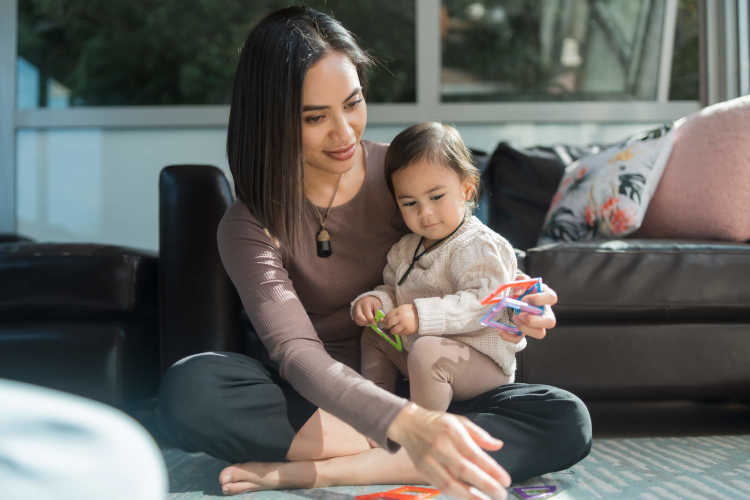Parental Concern For Kids’ Mental Health Skyrocketing
- Almost half (46%) of all parents say their biggest worry for their children is the future state of their mental health
- 57% say they are worried about their children’s current mental health
- 49% of parents say they are concerned about their child’s physical health
More than half of Kiwi parents (57%) are concerned about the current state of their children’s mental health, a trend that’s steadily increased since 2020, when nib found that less than a third of parents cited mental health in kids as a primary worry.
Mental health concerns are also ranked higher by parents than the concern they have around their children’s physical health. Just under half, 49%, said they were worried about physical health, up 5% from last year.
The fifth annual nib State of the Nation Parenting Survey found that in many areas parents have, during the survey period, never been more concerned for their kids. The survey canvassed the views of 1,206 parents, step-parents and guardians across Aotearoa New Zealand between 12th – 22nd June 2023.
Worry plagues all facets of parenting, from physical and mental health to the impacts of technology and social media, alongside behavioural issues.
A mother of secondary school children said her biggest concern for her children’s future is “mental health and wellbeing and having healthy friendships and relationships.” This concern is shared by almost half of other parents (46% up from 40% in 2022).
Of the physical health concerns most impacting children, parents reported that the top three that their child(ren) experienced were sleeping problems (34%), behavioural issues like tantrums, problematic eating and bullying (28%) and diet and exercise (25%).
The survey also noted that post-pandemic, parents are observing increases in a range of negative behaviours including separation anxiety, problem eating habits, tantrums, mental health issues and physical or violent outbursts.
Bullying was up this year from 11% in 2021 to 16%, and worse in secondary (20%) and primary school aged kids (20%). Physical and violent outbursts were also up from 11% in 2021 to 15%. Children’s behavioural problems have been an issue for 84% of parents in the last 6 months of participating in the survey.
Nathan Wallis, nib resident parenting expert and neuroscience educator says that some behavioural issues in childhood are to be expected.
“Children are often dealing with big emotions and they’re still learning how to manage those feelings, so some behavioural issues like tantrums in preschoolers are completely normal. As parents it’s our job to support our kids with boundaries and role model good behaviour”.
“If parents are worried that behavioural issues might be an indication of a health issue, they should seek advice from their healthcare professional,” said Wallis.
Fewer parents able to access healthcare for their kids
Worryingly, parents say their ability to access the healthcare they need to address their children's health problems is decreasing. In 2021, two-thirds of people felt they were able to adequately access the level of support they needed. Just two years later, 7% fewer people feel they can access the level of support required – that’s an additional 63,280 households nationwide.
One concerned mother of primary age children said, “My son has disabilities and our experiences with the health system have been an absolute nightmare, even soul destroying at times.”
Māori children are experiencing more health-related concerns than other ethnic groups but positively they are able to access the support they need 78% (vs 59% overall). Māori parents (30%) are more likely than NZ European (12%), Asian (14%), Indian (10%) and Pacifica (15%) parents to use tele-health services for their children. Rob Hennin, nib New Zealand, Chief Executive Officer, said it was troubling that parents aren’t always able to access the healthcare they need for their kids.
“As parents we all want the best for our kids and for them to be happy and healthy, but sometimes it can be difficult navigating the health system. Access to health services (48%) and peace of mind (52%) are key reasons why parents have private health insurance but the cost of health insurance is a barrier for many families in the current economic environment”.
“We’ve seen some great progress in terms of tele-health and digi-health in the last few years and a bigger focus on mental health so hopefully we’re moving in the right direction,” said Hennin.
Parents motivated to proactively care for their own health
On the upside, 85% of parents are motivated to proactively look after their own health for their kids. The reasons for this are to be a good influence for their children (67%), to be able to show up for their children (56%) and keep up with them when running around and playing (56%).
Wallis says it’s encouraging to see parents prioritising their own health and wellbeing and being role models for their kids.
“It’s really important that parents look after their own mental and physical health so that they can show up for their kids. Proactively looking after your own health and wellbeing also has the added benefit of role modelling good behaviours to your kids. When parents role model healthy eating habits and exercise their kids tend to follow”.
“It might be as simple as coming together for a family meal or taking the kids for a walk or kick a ball around at the park. These healthy habits are great ways to bond with your kids and set them up for success,” adds Wallis.
For media enquiries please email [email protected]
